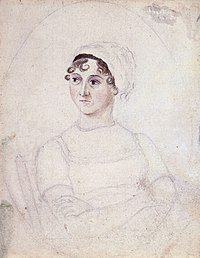
Back Jane Austen Afrikaans ጀይን ኦስትን Amharic Jane Austen AN Iane Austen ANG جاين أوستن Arabic چين اوستين ARZ জেন অষ্টিন Assamese Jane Austen AST Jane Austen AVK Jane Austen Aymara
Jane Austen | |
|---|---|
 Portrait, c. 1810[a] | |
| Born | 16 December 1775 Steventon, Hampshire, England |
| Died | 18 July 1817 (aged 41) Winchester, Hampshire, England |
| Resting place | Winchester Cathedral, Hampshire |
| Occupation | Novelist |
| Alma mater | Reading Abbey Girls' School (1785–1786) |
| Period | Georgian (Regency era) |
| Genre | |
| Years active | 1787–1817 |
| Notable works | |
| Relatives | Family and ancestry |
| Signature | |
Jane Austen (/ˈɒstɪn, ˈɔːstɪn/ OST-in, AW-stin; 16 December 1775 – 18 July 1817) was an English novelist known primarily for her six novels, which implicitly interpret, critique, and comment upon the English landed gentry at the end of the 18th century. Austen's plots often explore the dependence of women on marriage for the pursuit of favourable social standing and economic security. Her works are implicit critiques of the novels of sensibility of the second half of the 18th century and are part of the transition to 19th-century literary realism.[2][b] Her use of social commentary, realism, wit, and irony have earned her acclaim amongst critics and scholars.
The anonymously published Sense and Sensibility (1811), Pride and Prejudice (1813), Mansfield Park (1814), and Emma (1816) were modest successes, but they brought her little fame in her lifetime. She wrote two other novels—Northanger Abbey and Persuasion, both published posthumously in 1817—and began another, eventually titled Sanditon, but it was left unfinished upon her death. She also left behind three volumes of juvenile writings in manuscript, the short epistolary novel Lady Susan, and the unfinished novel The Watsons.
Since her death Austen's novels have rarely been out of print. A significant transition in her reputation occurred in 1833, when they were republished in Richard Bentley's Standard Novels series (illustrated by Ferdinand Pickering and sold as a set). They gradually gained wide acclaim and popular readership. In 1869, her nephew published A Memoir of Jane Austen. Her work has inspired a large number of critical essays and has been included in many literary anthologies. Her novels have been adapted in numerous films including Sense and Sensibility (1995), Pride and Prejudice (2005), Emma. (2020), and Love & Friendship (2016), as well the BBC movie Persuasion (1995), and BBC miniseries Pride and Prejudice (1995).
Cite error: There are <ref group=lower-alpha> tags or {{efn}} templates on this page, but the references will not show without a {{reflist|group=lower-alpha}} template or {{notelist}} template (see the help page).